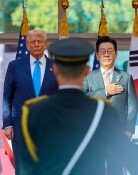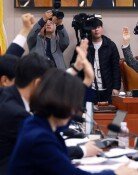[Diplomatic News] We Are At Home In Korea, So We Decided to Settle Down Here
[Diplomatic News] We Are At Home In Korea, So We Decided to Settle Down Here
Posted August. 26, 2005 03:06,
Everybody has a country which they feel so attracted to, so they want to settle down there. But when CEOs of renowned foreign companies decide to leave their own home countries to stay in Korea, many people may wonder why.
Past experience and prejudice against Korea indicate that Koreans are not that kind and Seoul doesnt offer the best living environment. Traffic is terrible and there is considerable animosity against foreigners among Koreans.
What aspects of Korea have convinced the high-flyers, who used to work at the headquarters of global companies, to give up everything in their home countries to come to Korea? Three foreign CEOs who have settled down in Korea in different ways told us why they fell in love with the nation. They are Christopher Wood (45), country manager of ELCA Korea, Sammy Loutfy (53), president of Henkel Korea, and Bernhard Brender, general manager of Millennium Seoul Hilton Korea.
Christopher Wood, the Country Manager of ELCA Korea-
Wood, the manager of ELCA Korea, which is a distributor of cosmetics including Estee Lauder, Clinique and Mac, had served as the country manager in Korea for the period between 2000 and 2002.
He came back to Korea July this year after working in Japan as country manager of Estee Lauder there. He turned down a job offer in the companys New York headquarters to return to Korea.
Why? I feel like at home here.
He has a good command of Korean. He speaks Japanese too, but he said he used English in Japan just like other foreigners.
Korea and Japan are two totally different countries. Korea puts emphasis on results, while Japan values how those results are achieved. As a manager, I feel comfortable working with Koreans. Japanese resist change but Koreans welcome it.
He also said Koreans are kind towards foreigners who speak Korean, but Japanese seem as if they say Well, OK., when they are spoken to in Japanese.
And these factors make him worried about the future of Japan as a nation which has trouble in adopting itself to changes.
He said things have dramatically changed in Korea so far. The real estate market has been sluggish, and department stores are struggling in the face of economic recession.
He believes that the department store should be a place to sell not only products but also happiness and values.
Sammy Loutfy, President of Henkel Korea-
He arrived at Gimpo airport in October, 1989. The Egyptian-born man who was raised in Australia was terrified by the chilly autumn weather of Korea and dreary atmosphere around the airport, saying Oh, My God, where am I now.
You should have patience and wisdom when you judge a person. Its just like a marriage. In this regard, I feel that I am married to Korea.
He gave this answer to the question Since when you began to like Korea? Last year, he made an agreement with the Henkel Corporation to stay in Korea until he retires.
When headquarters executives visit Korea, I make sure to invite them to a restaurant where they have to sit on the floor and use chopsticks. Some complain that its uncomfortable to sit on the floor and the Kimchi is too salty, but I embrace them all as a part of life here.
He especially likes To J sung by Lee Sun-hee and he has special affection for arirang (Korean traditional songs), and spinning sangmo, a traditional hat and drum dance. He is also eager to let the world know about Korea. After acquiring Hongsung Chemical, a manufacturer of acoustic sound enclosures for cars, and Lucky Silicon, a silicone manufacturer, he is now busy exporting products to Australia and China. He said, I will market Koreas competitive products by working as a liaison between Korea and the company headquarters just as a diplomat.
Bernhard Brender, General Manager of Millennium Seoul Hilton Korea
He was awarded with honorary citizenship of Seoul earlier this year. The honorary citizenship was also given to Guss Hiddink, a former coach of the Korea national soccer team, after the Korea-Japan World Cup in 2002. Approximately 300 foreigners have been so far named as honorary citizens of Seoul.
Matching his newly earned citizenship, he was the only resident in the UN village neighborhood in Hannam-dong, Yongsan-gu, Seoul to hang a Taegeuk-gi for Independence Day this year.
He chose to stay in Korea, where he has been staying for 15 years now, turning down an offer to transfer to Hawaii.
I particularly like cycling along the Han-river on weekends. When I see people swimming, saying hello, enjoying fresh air and eating, I feel that this is a true life.
He visited his native country, Germany, for a summer holiday recently. When the two weeks had passed, he told his daughter, lets get back home.
As a former chef, he is very good at cooking. He serves as the chairman of the Seoul branch of Chaîne des Rôtisseurs, which is an exclusive gourmet social club. The Seoul branch of the club, which started in France in 1248, has 160 members, including foreign ambassadors in Korea, general managers of luxury hotels, and professors, including Lee Bu-jin, the senior managing director of Shilla Hotels.
Im-Sook Ha artemes@donga.com







